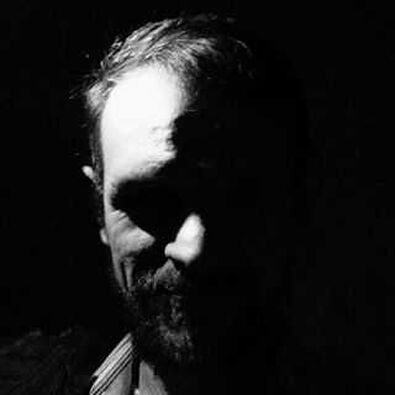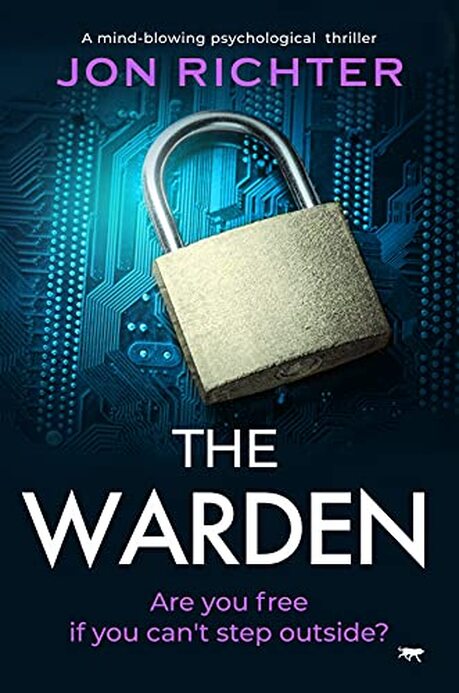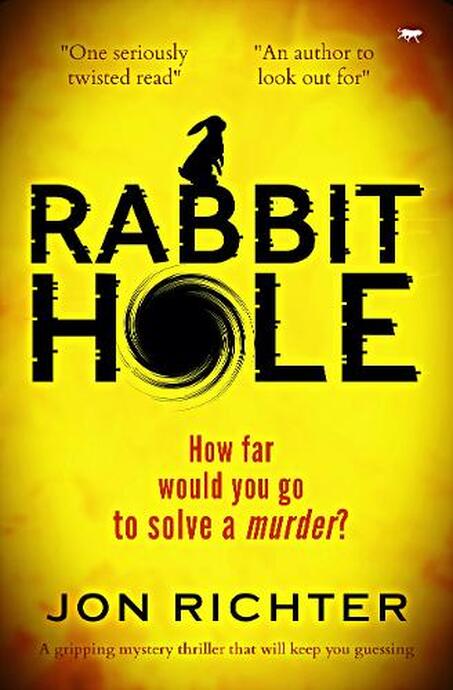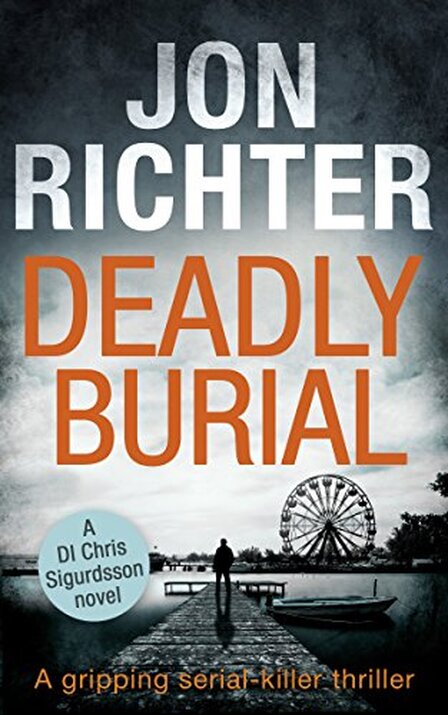
It gives me great pleasure to welcome Jon Richter onto the website today. Jon writes dark fiction, and to date, has penned three gripping crime thrillers, two collections of short horror fiction, a cyberpunk thriller, and a psychological techno-thriller.
Alex: Tell us a bit about yourself, Jon.
Jon: Hello there! Thanks so much for the opportunity to be featured on your ace site. My name is Jon Richter, a 38-year-old writer of dark fiction currently based in London, although I was born and brought up in Wigan (famous for pies, the British Bulldog, pies, the world’s most laughably small pier, and more pies!) I’ve written seven books to date, spanning multiple genres including crime thrillers, cyberpunk, horror, and my most recent novel The Warden which is probably my weirdest yet and is – I think – a psychological techno-thriller! But more on that later…
I love dark and sinister stories in any format; everything from books to films to video games (which I believe are a unique and underrated storytelling medium given their unparalleled interactivity and immersion). I can’t remember a time when I wasn’t gobbling up creepy fiction and trying to create my own, even well before I was a teenager. One of my earliest reading memories is picking up The Dark Portal by Robin Jarvis at my primary school ‘book fair’ and being horrified – but delighted – by the twisted tale of brave mice making a stand against an army of rats and their sinister god in the sewers beneath Deptford. I was recently over the moon when Robin replied to one of my Tweets about the book, proving I suppose that social media isn’t all bad!
If you’re interested in finding out more about me you can seek out my books on Amazon by searching for Jon Richter, or visit my website at www.jon-richter.com
Alex: Tell us a bit about yourself, Jon.
Jon: Hello there! Thanks so much for the opportunity to be featured on your ace site. My name is Jon Richter, a 38-year-old writer of dark fiction currently based in London, although I was born and brought up in Wigan (famous for pies, the British Bulldog, pies, the world’s most laughably small pier, and more pies!) I’ve written seven books to date, spanning multiple genres including crime thrillers, cyberpunk, horror, and my most recent novel The Warden which is probably my weirdest yet and is – I think – a psychological techno-thriller! But more on that later…
I love dark and sinister stories in any format; everything from books to films to video games (which I believe are a unique and underrated storytelling medium given their unparalleled interactivity and immersion). I can’t remember a time when I wasn’t gobbling up creepy fiction and trying to create my own, even well before I was a teenager. One of my earliest reading memories is picking up The Dark Portal by Robin Jarvis at my primary school ‘book fair’ and being horrified – but delighted – by the twisted tale of brave mice making a stand against an army of rats and their sinister god in the sewers beneath Deptford. I was recently over the moon when Robin replied to one of my Tweets about the book, proving I suppose that social media isn’t all bad!
If you’re interested in finding out more about me you can seek out my books on Amazon by searching for Jon Richter, or visit my website at www.jon-richter.com

Alex: How would you describe your writing, and are there particular themes that you like to explore?
Jon: It’s a tricky one to articulate, but I like dark fiction that is ‘fun’ rather than ‘depressing’. My stories are much more likely to be about a spaceship that develops a taste for human flesh and decides to eat its own crew than they are to be about, say, real-life abuse. That’s not to say that I don’t like to tackle more serious and realistic subjects, but I’m always aiming for fun, entertaining, gripping, twisting (and usually twisted) narratives that a reader can plough through breathlessly in a couple of sittings – or at least, that’s the hope!
I’m also very much interested in emerging new technology and its impact on our society, and have explored these themes in some of my short horror fiction as well as my cyberpunk novel, Auxiliary, and most recently in my latest thriller, The Warden, which I’ll explain more about below.
Alex: Are you a writer that plans a detailed synopsis or do you set out with a vague idea and let the story unfold as you write?
Jon: My first couple of novels were fairly meticulously planned, but as I’ve become more confident as a writer I’m now happier to let things unfold a bit more as they go. This approach has definitely got me into a couple of tricky corners, but the ‘eureka’ moment when you manage to plot your way out of such narrative tangles is all part of the fun! Different writers definitely have very different approaches, but in my case I think too much planning tends to sap the fun and excitement out of an idea – better to get cracking while the inspiration is still inspiring!
Alex: Tell us about your latest novel.
Jon: The Warden is a mad book that represents my attempts to ‘process’ the equally mad year-and-a-half we’ve all experienced and endured since the COVID outbreak. The virus features in the story, and if that’s something that will put some readers off then I totally understand, but I think it’s important for fiction to explore difficult topics and subjects that are part of our lives.
In the alternate timeline of the story, the virus has continued to mutate, keeping people trapped permanently indoors in a seemingly endless state of lockdown. This suits the main protagonist, Eugene Dodd, a retired detective who has suffered with agoraphobia since the traumatic death of his wife. But when the manager of his high-tech ‘smart apartment’ building is brutally murdered, and the AI that operates the ‘virus-proof’ prototype seems determined to cover it up, Eugene is forced to step outside the comfort of his home – and his prison – for the first time in years. What he learns will turn his world upside down, and the ordeal he must survive will excite and shock readers, particularly those that enjoy murder mysteries, gripping thrillers like Die Hard, or techno-fiction like Black Mirror.
I’m really proud of the book, and proud of the fact that it is about as non-formulaic as a story can get – I don’t follow templates when I write, and I tend to keep my ideas filter turned pretty close to ‘off’! I think the novel will be enjoyable to any fiction readers, even those who would normally shy away from any ‘sci-fi’ type content, and I’ve been delighted to see some very positive early reviews including from people who ‘wouldn’t normally read this sort of thing’.
Jon: It’s a tricky one to articulate, but I like dark fiction that is ‘fun’ rather than ‘depressing’. My stories are much more likely to be about a spaceship that develops a taste for human flesh and decides to eat its own crew than they are to be about, say, real-life abuse. That’s not to say that I don’t like to tackle more serious and realistic subjects, but I’m always aiming for fun, entertaining, gripping, twisting (and usually twisted) narratives that a reader can plough through breathlessly in a couple of sittings – or at least, that’s the hope!
I’m also very much interested in emerging new technology and its impact on our society, and have explored these themes in some of my short horror fiction as well as my cyberpunk novel, Auxiliary, and most recently in my latest thriller, The Warden, which I’ll explain more about below.
Alex: Are you a writer that plans a detailed synopsis or do you set out with a vague idea and let the story unfold as you write?
Jon: My first couple of novels were fairly meticulously planned, but as I’ve become more confident as a writer I’m now happier to let things unfold a bit more as they go. This approach has definitely got me into a couple of tricky corners, but the ‘eureka’ moment when you manage to plot your way out of such narrative tangles is all part of the fun! Different writers definitely have very different approaches, but in my case I think too much planning tends to sap the fun and excitement out of an idea – better to get cracking while the inspiration is still inspiring!
Alex: Tell us about your latest novel.
Jon: The Warden is a mad book that represents my attempts to ‘process’ the equally mad year-and-a-half we’ve all experienced and endured since the COVID outbreak. The virus features in the story, and if that’s something that will put some readers off then I totally understand, but I think it’s important for fiction to explore difficult topics and subjects that are part of our lives.
In the alternate timeline of the story, the virus has continued to mutate, keeping people trapped permanently indoors in a seemingly endless state of lockdown. This suits the main protagonist, Eugene Dodd, a retired detective who has suffered with agoraphobia since the traumatic death of his wife. But when the manager of his high-tech ‘smart apartment’ building is brutally murdered, and the AI that operates the ‘virus-proof’ prototype seems determined to cover it up, Eugene is forced to step outside the comfort of his home – and his prison – for the first time in years. What he learns will turn his world upside down, and the ordeal he must survive will excite and shock readers, particularly those that enjoy murder mysteries, gripping thrillers like Die Hard, or techno-fiction like Black Mirror.
I’m really proud of the book, and proud of the fact that it is about as non-formulaic as a story can get – I don’t follow templates when I write, and I tend to keep my ideas filter turned pretty close to ‘off’! I think the novel will be enjoyable to any fiction readers, even those who would normally shy away from any ‘sci-fi’ type content, and I’ve been delighted to see some very positive early reviews including from people who ‘wouldn’t normally read this sort of thing’.

Alex: What was the first book you read?
Jon: I mentioned earlier that I’m a big fan of video games and for using this medium to tell unique, interactive stories. Before I graduated onto ‘grown up’ books, I remember enjoying various text adventures on my ZX Spectrum when I was very young. In the modern world of micro-budget ‘indie games’, this genre has had something of a revival, with some absolutely brilliant recent examples like Anchorhead, but for those who aren’t aware of them, text adventures are an interactive novel in the truest sense – you play the main character in a story, reading text that describes your current situation, sometimes accompanied by rudimentary graphics, and then type words to instruct the character how to proceed.
My strongest memory is of a game called Waxworks, where you find yourself trapped in a creepy exhibit, after hours and with very little information about how you got there. Despite the incredibly limited graphics, I remember being deeply unsettled by the game and my increasingly desperate attempts to escape, so much so that disturbing waxwork creations featured in one of my own books, my 2018 crime thriller Never Rest. I think my love of dark fiction stems from these sinister games and books I enjoyed at a very young age – I’m holding you responsible, mum!
Alex: How much research do you do and what does it usually entail?
Jon: We are very lucky to exist in an age of unprecedented information sharing, and tools like Google and YouTube really are invaluable to a writer. I don’t like to base my fiction solidly in the realms of reality – even my crime thrillers have fictional settings – but when it’s appropriate I do like to make sure things are as factually accurate as possible. Researching books can lead you down some fascinating online rabbit holes, and like a lot of authors I do sometimes worry what someone would think of my internet search history!
Jon: I mentioned earlier that I’m a big fan of video games and for using this medium to tell unique, interactive stories. Before I graduated onto ‘grown up’ books, I remember enjoying various text adventures on my ZX Spectrum when I was very young. In the modern world of micro-budget ‘indie games’, this genre has had something of a revival, with some absolutely brilliant recent examples like Anchorhead, but for those who aren’t aware of them, text adventures are an interactive novel in the truest sense – you play the main character in a story, reading text that describes your current situation, sometimes accompanied by rudimentary graphics, and then type words to instruct the character how to proceed.
My strongest memory is of a game called Waxworks, where you find yourself trapped in a creepy exhibit, after hours and with very little information about how you got there. Despite the incredibly limited graphics, I remember being deeply unsettled by the game and my increasingly desperate attempts to escape, so much so that disturbing waxwork creations featured in one of my own books, my 2018 crime thriller Never Rest. I think my love of dark fiction stems from these sinister games and books I enjoyed at a very young age – I’m holding you responsible, mum!
Alex: How much research do you do and what does it usually entail?
Jon: We are very lucky to exist in an age of unprecedented information sharing, and tools like Google and YouTube really are invaluable to a writer. I don’t like to base my fiction solidly in the realms of reality – even my crime thrillers have fictional settings – but when it’s appropriate I do like to make sure things are as factually accurate as possible. Researching books can lead you down some fascinating online rabbit holes, and like a lot of authors I do sometimes worry what someone would think of my internet search history!

Alex: Do you ever base your characters on people you have encountered in real life?
Jon: There’s a running joke amongst writers that if you get on our nerves, we’ll kill you off in our next story… but in truth this isn’t something I do very often! I enjoy the process of inventing a character and ‘brainstorming’ information about them, honing the details and enjoying the little oddities that emerge while you’re writing them into a book. I did, though, once write a short story called ‘The Execs’ that was about a corporate leadership team forced to kill each other off in a Battle Royale/Hunger Games scenario, which was a load of fun to write – some of these characters may have been at least partially based on my employers at the time…
Alex: Which was the last book you read that blew you away?
Jon: I read House Of Leaves by Mark Danielewski a few years ago after a friend’s recommendation, and I was absolutely mesmerised by it. Never before have I so strongly had the sensation that a book was reading me, not the other way around! I don’t want to spoil too much, but if anyone is interested it’s well worth splashing out on the paperback version and enjoying being drawn inexorably into a spiralling descent into madness…
Alex: How do you market your books?
Jon: In short, badly! Marketing isn’t an area that I enjoy, and I think this is true of a lot of writers – we write because we love writing books, not selling them. However, I think I’m (slowly) getting better, and now have a website I’m pretty happy with, as well as enjoying interacting with people on Twitter and Facebook. The dream is, of course, to land a huge publishing deal and see my paperbacks on the shelves in Waterstones, but it’s great to have alternative routes into readers’ hands via indie publishers and eBook devices.
Jon: There’s a running joke amongst writers that if you get on our nerves, we’ll kill you off in our next story… but in truth this isn’t something I do very often! I enjoy the process of inventing a character and ‘brainstorming’ information about them, honing the details and enjoying the little oddities that emerge while you’re writing them into a book. I did, though, once write a short story called ‘The Execs’ that was about a corporate leadership team forced to kill each other off in a Battle Royale/Hunger Games scenario, which was a load of fun to write – some of these characters may have been at least partially based on my employers at the time…
Alex: Which was the last book you read that blew you away?
Jon: I read House Of Leaves by Mark Danielewski a few years ago after a friend’s recommendation, and I was absolutely mesmerised by it. Never before have I so strongly had the sensation that a book was reading me, not the other way around! I don’t want to spoil too much, but if anyone is interested it’s well worth splashing out on the paperback version and enjoying being drawn inexorably into a spiralling descent into madness…
Alex: How do you market your books?
Jon: In short, badly! Marketing isn’t an area that I enjoy, and I think this is true of a lot of writers – we write because we love writing books, not selling them. However, I think I’m (slowly) getting better, and now have a website I’m pretty happy with, as well as enjoying interacting with people on Twitter and Facebook. The dream is, of course, to land a huge publishing deal and see my paperbacks on the shelves in Waterstones, but it’s great to have alternative routes into readers’ hands via indie publishers and eBook devices.

Alex: What are your interests aside from writing? And what do you do to unwind?
Jon: I co-host a fortnightly podcast called Dark Natter, where my co-host and other guests discuss their favourite works of dark fiction, which is fantastic fun and has enabled me to meet a load of really interesting people! I’d love to get more listeners to discover the show, so please do search it out on YouTube or on any of the major podcasting services.
I also try to keep fit and do a lot of running, and will be tackling the London marathon later in 2021 to raise money for St John Ambulance. Training for a long-distance event can be gruelling and pretty boring, but there’s always a good podcast or audiobook to listen to, and an endless supply of good music!
Sadly for me, my day job is as an accountant, and juggling this and my writing career keeps me far too busy to unwind, but when I do have any spare hours I try to cram in as much reading, movie-watching and video gaming as I can! For any PS5 owners, I can highly recommend Returnal, which is proving unexpectedly brilliant and a massive time sink…
Alex: Which authors do you particularly admire and why?
Jon: My favourite writer is Iain Banks, whose complete works I have read in full, including all of the science fiction he published as Iain M Banks. His tragic recent death has undoubtedly robbed us of dozens more future classics, but we’re lucky he was as prolific as he was throughout his life, and I would highly recommend his hugely original and unique novels – and not just limited to his infamous debut, The Wasp Factory. That book is undoubtedly a dark masterpiece, but I feel the writer transcended it in subsequent years, and sometimes I think it’s a shame that it seemed to remain his most famous work.
Alex: Thank you so much for sharing all this with us, Jon. I'm hugely impressed that you have managed to write your novels while holding down another full-time job. That is one hell of a feat. And I take my hat off to you! I shall have to check out your podcast. Anyway, thank you. It's been fascinating to hear your take on this weird and wonderful business of writing.
Jon: Thank you, Alex for inviting me over.
Jon: I co-host a fortnightly podcast called Dark Natter, where my co-host and other guests discuss their favourite works of dark fiction, which is fantastic fun and has enabled me to meet a load of really interesting people! I’d love to get more listeners to discover the show, so please do search it out on YouTube or on any of the major podcasting services.
I also try to keep fit and do a lot of running, and will be tackling the London marathon later in 2021 to raise money for St John Ambulance. Training for a long-distance event can be gruelling and pretty boring, but there’s always a good podcast or audiobook to listen to, and an endless supply of good music!
Sadly for me, my day job is as an accountant, and juggling this and my writing career keeps me far too busy to unwind, but when I do have any spare hours I try to cram in as much reading, movie-watching and video gaming as I can! For any PS5 owners, I can highly recommend Returnal, which is proving unexpectedly brilliant and a massive time sink…
Alex: Which authors do you particularly admire and why?
Jon: My favourite writer is Iain Banks, whose complete works I have read in full, including all of the science fiction he published as Iain M Banks. His tragic recent death has undoubtedly robbed us of dozens more future classics, but we’re lucky he was as prolific as he was throughout his life, and I would highly recommend his hugely original and unique novels – and not just limited to his infamous debut, The Wasp Factory. That book is undoubtedly a dark masterpiece, but I feel the writer transcended it in subsequent years, and sometimes I think it’s a shame that it seemed to remain his most famous work.
Alex: Thank you so much for sharing all this with us, Jon. I'm hugely impressed that you have managed to write your novels while holding down another full-time job. That is one hell of a feat. And I take my hat off to you! I shall have to check out your podcast. Anyway, thank you. It's been fascinating to hear your take on this weird and wonderful business of writing.
Jon: Thank you, Alex for inviting me over.
